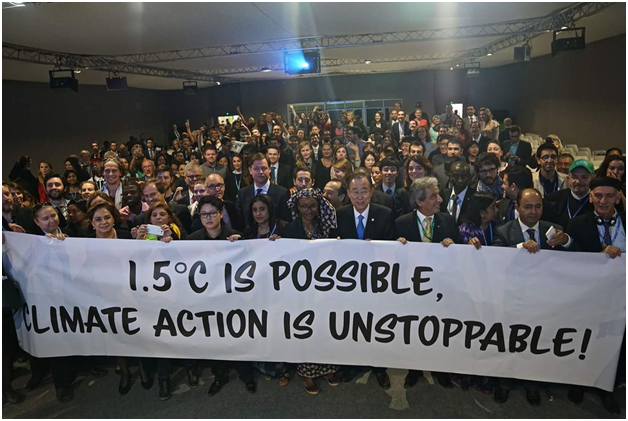
Cycling and the UN Conference COP22 in Marrakech November 2016
In the beginning of November, Bernhard ENSINK, ECF Secretary General, participated in COP 22 – the annual United Nations Climate Change Conference in Marrakesh, Morocco. These conferences serve as a meeting place for the signatories of the United Nations Framework Convention on Climate Change and all the interested stakeholders aiming to combat the climate change. At COP22, Bernhard ENSINK was spreading ECF’s and World Cycling Alliance’s (WCA) message that Cycling delivers – it contributes to all the Sustainable Development Goals, and especially to the fight against climate change as it helps to reduce Green House Gas emissions, 25% of which come from transport (mostly road transport). The main outcome of this year’s conference was a one page Marrakech Action Proclamation which re-confirms the Paris Agreement of COP21: “We welcome the Paris Agreement … its rapid entry into force, with its ambitious goals …”
What does COP22 mean for Cycling? What does cycling mean for Climate Action?
The Marrakech Action Proclamation states that “this year, we have seen extraordinary momentum on climate change worldwide … This momentum is irreversible … Our task now is to rapidly build on that momentum [, together, moving forward purposefully to reduce greenhouse gas emissions and to foster adaptation efforts, thereby benefiting and supporting the 2030 Agenda for Sustainable Development and its Sustainable Development Goals.” The cycling sector – cyclists, NGOs as we are, governments on all levels, the cycling industry – should realize: We have a good story! Cycling delivers! Not only on Climate Action – cycling delivers directly on 12 Sustainable Development Goals. To convey this message to decision makers and their advisers ECF and WCA together use the COP conferences already since COP20 2014. Always widening the scope: Invest in more people cycling, more often: you will get much more than better transport or less GHG emissions: you get all the social, economic and environmental benefits of cycling.
What I learnt in Marrakech?
At Transport Day, organized by the community of promoters of Sustainable Transport, the Partnership for Sustainable and Low Carbon Transport SLoCaT in the Alliance of PPMC (Paris Process on Mobility and Climate): the sustainable transport sector has to work more with the (renewable) energy sector, the ministers of economy and finance and the health sector. People care first about their health and jobs – and politicians about the economy, jobs, and the costs of the health sector. Fortunately talking jobs and health is already part of ECF’s advocacy and campaign strategies.
At a PPMC round table with representatives from businesses and industry it became clear that the transitions in the industrial transport sector will be huge due to new technologies and the decarbonization of transport. The transition has big societal impacts, e.g. for the workers in the industry – therefore civil society, the citizens have to be involved. In stressed in my intervention that the cycling industry is changing also as new players invest now in new technologies that support cycling (electric assisted bicycles; apps; public bicycle sharing systems). I highlighted also the support of ECF’s Cycling Industry Club to advocacy for and promotion of cycling.
In many discussions participants called for more involvement of citizens and civil society to get a sustainable transition to sustainable transport, cities and regions. At an event where the Transport Initiatives were showcased I stated: ‘To get the right policies and sustainable lifestyles we need to organize civil society’s support to the political and business leaders to go the right way. We are their customers and their voters!’ On behalf of ECF and WCA I re-confirmed our commitment to the UN to collaborate on Climate Action and achieving the SDGs, referring to the exchange of knowledge and experience on cycling we organize worldwide, e.g. via our global cycling summits, the Velo-city Series . And I called on all to support our campaign for an UN adopted World Bicycle Day, to acknowledge and to support all the civil society organizations’ work worldwide and to inspire decision makers and people around the globe.

What really happened on the ground in Marrakech?
In any case I can report real change on the ground in the city of Marrakech: the launching of a new, sophisticated public bicycle sharing system (Medina Bike) by ECF’s Cycling Industry Club member Smoove. The new system was very visible in front of the COP22 venue.
As Smoove introduced new technologies with the Medina Bike, Pikala did start in Marrakech the Holland Bicycle Atelier, officially opened during COP22 by the Dutch Minister for Environment Sharon Dijkstra.

I really hope that this great project takes off and brings a number of jobs to currently unemployed people and a lot of bicycles on the streets of Marra kech – replacing hopefully many mopeds, that are a big source of air pollution in the streets of this wonderful city. BTW: combatting air pollution seems to be a main driver of transport policies in Asian cities – just another proof that we have to talk jobs and health. And that our cycling community does deliver!
Network/Project Involved:
Contact the author
Recent news!
Upcoming events
Contact Us
Avenue des Arts, 7-8
Postal address: Rue de la Charité, 22
1210 Brussels, Belgium









